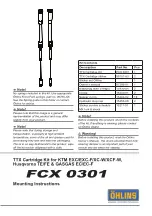
156
Infiniium V-Series Oscilloscopes Service Guide
7
Theory of Operation
circuit consisting of a detector diode and a non-inverting op-amp gain stage
followed by a window comparator ensures the user supplies a 10 MHz signal of the
correct amplitude (-5 dBm minimum to +10 dBm maximum). The detector circuit
produces a warning if the external reference input signal is too small or too large,
but not if the signal is within the specified operating range. The frequency of this
external reference must be very close to 10 MHz (typ-20 ppm) or the 100
MHz oscillator will not be able to lock to it.
The internal and external reference inputs are applied to each input of a very high
isolation RF switch. The isolation between the two inputs is greater than 100 dB to
prevent the internal and external 10 MHz clocks from interfering with each other.
This 10 MHz reference, either internal or external, is split into two signal paths.
One path goes to the rear panel as described earlier for use as a reference for
some other instrument, and the second path is limited and filtered for use as the
reference input to the 100 MHz phase-locked oscillator. The signal that goes to
the rear panel is very close to the same amplitude as either the internal reference
oscillator output amplitude or the input amplitude of the external signal applied to
the external reference input connector, depending on which one the user selected.
The reference signal that goes to the 100 MHz oscillator input is a sine wave of
amplitude 0 dBm +/-3 dB.
The actual 10 GHz sample clock is generated with a DRO that is phase-locked to
the 100 MHz oscillator output.
Trigger system
The trigger system contains an FPGA that is used to coordinate the trigger system
operation and two trigger ICs. The FPGA uses a 212.5 MHz clock that is
synchronous to the main communication FPGA clock. The trigger ICs are the main
trigger-handling chips, programmed with a serial interface from the main
communication FPGA. Each trigger IC also receives two DAC signals that set the
internal clock and data timers. The trigger IC is used for setting the timing for the
logic trigger from 0.3 ns to 20 ns. The trigger FPGA is used for times greater than
20 ns.
Summary of Contents for Infiniium MSOV 084A
Page 1: ...Keysight Infiniium V Series Oscilloscopes Service Guide...
Page 6: ...6 Infiniium V Series Oscilloscopes Service Guide...
Page 14: ...14 Infiniium V Series Oscilloscopes Service Guide 1 General Information...
Page 22: ...22 Infiniium V Series Oscilloscopes Service Guide 2 Calibration...
Page 52: ...52 Infiniium V Series Oscilloscopes Service Guide 3 Testing Performance...
Page 132: ...132 Infiniium V Series Oscilloscopes Service Guide 5 Replacing Assemblies...
Page 162: ...162 Infiniium V Series Oscilloscopes Service Guide 7 Theory of Operation...
Page 163: ......









































